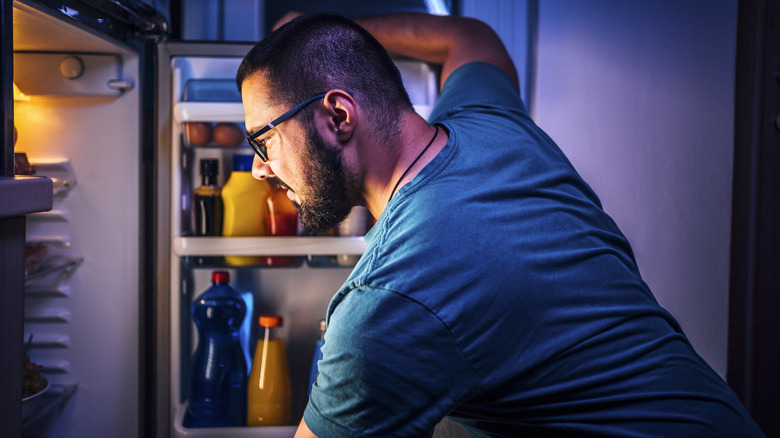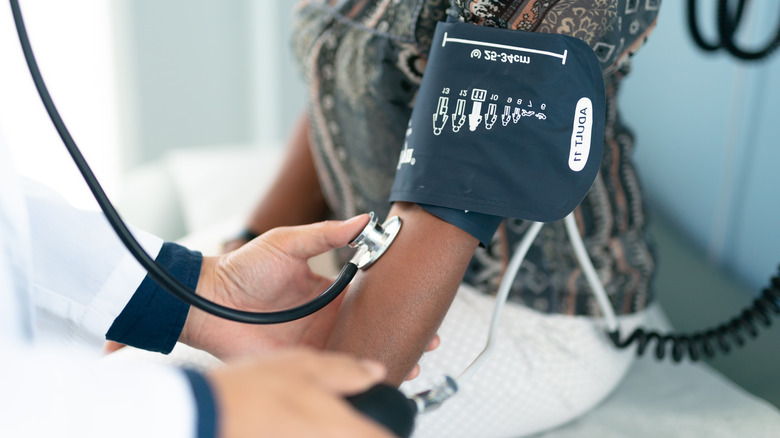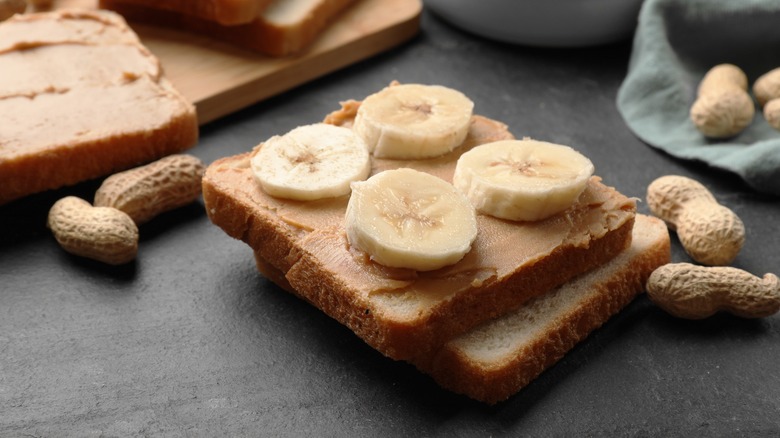The Healthy Snack You Should Eat Before Bed To Help High Blood Pressure
We may receive a commission on purchases made from links.
A healthy bedtime snack doesn't have to be boring. Some can be both nutritious and delicious, potentially helping regulate blood pressure levels as we snooze. Registered dietitian and nutrition expert Frances Largeman-Roth told Well+Good that the magic sleep-boosting combo is nut butter and banana. To get a second opinion, Health Digest spoke with Maggie Moon, MS, RD, Los Angeles-based registered dietitian and author of a new book, "The MIND Diet: 2nd Edition" (Simon & Schuster, 2024). Working closely with the National Peanut Board to help consumers make healthy choices, Moon gave us the inside scoop on how these two foods may benefit people with hypertension.
Moon started off by explaining that between the two, peanut butter and banana is a snack rich in magnesium and potassium, both of which are pivotal to maintaining healthy blood pressure levels, among other essential functions. "They are humble overachievers, and are some of the body's busiest multi-taskers," Moon stated. In fact, you'll find a number of foods with high magnesium and potassium content included in The Dietary Approaches to Stop Hypertension (DASH) eating plan.
How potassium and magnesium benefit high blood pressure
Moon explained that most people in the U.S. lack sufficient amounts of potassium. "Getting too little increases blood pressure, and getting more lowers blood pressure and the risk of stroke, especially if you decrease sodium at the same time," she said. That's because potassium rids the body of excess sodium, which otherwise increases blood pressure. As one's potassium intake increases, sodium levels decrease.
While magnesium may not have as significant an effect on lowering blood pressure as potassium, the two go hand in hand. Having low levels of magnesium in the body can deplete levels of potassium, Moon stated. Therefore, it's important that we get enough magnesium in our diet to maintain healthy potassium levels. Together, the two minerals reduce blood pressure by relaxing the blood vessels. According to the National Institutes of Health (NIH), the recommended daily intake of potassium for adults ages 19 and older falls between 2,600 milligrams and 3,400 milligrams. For magnesium, adults ages 31 and up are encouraged to get between 320 milligrams and 420 milligrams daily (via NIH).
The nutritional value of banana and peanut butter
As far as bedtime snacks go, eating peanut butter and banana is a solid nutritional choice, Moon stated. In one serving of peanut butter, we receive 10% of the recommended Daily Value of magnesium. When paired with bananas, the fruit makes up for what peanut butter lacks in potassium. "They're a great match-up to get plenty of both, plus you'll be getting plant-based protein from the peanut butter with 7 g of protein per serving, and fiber and natural energy, too," Moon added.
Moon emphasized that these health benefits are in reference to dietary sources of potassium and magnesium, as opposed to supplements, which may potentially pose risks to people with kidney issues. In healthy individuals, however, the kidneys should be well-equipped to handle an increased intake of potassium- and magnesium-packed foods. Before taking any supplements — or before adding a peanut butter and banana snack to your nighttime routine — talk with your healthcare provider, particularly if you are diagnosed with any kidney conditions or take any drugs that may potentially interact with the two minerals.
To learn more about Maggie Moon, visit her website or order a copy of "The MIND Diet: 2nd Edition" on Amazon.



